
Tell us what you need to find a matching loft conversion specialist

Get free quotes from professionals near you

Compare offers and choose the one that best matches your need
- Householdquotes.co.uk
- Driveway
- Driveway Materials
- Block Paving Guide
- Block Paving Driveway Cost
Block Paving Driveway Cost UK: The 2024 Guide

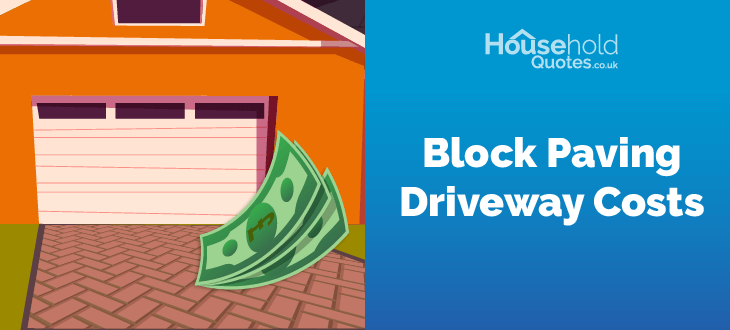
- The average cost of a block paving driveway is approximately £100 per square metre.
- Typically, you will need 50 blocks to cover 1 square metre.
- You can choose between natural stone, clay, or concrete blocks, which will affect the cost. Natural stone is more expensive, while concrete is the most affordable option.
- Hiring driveway specialists to install your block paving driveway will cost between £150 and £200. The labour cost will increase with the size and complexity of the driveway design.
- You can replace damaged block pavers to save on labour costs, but you will need a specialised tool, which you can rent for £50 to £100.
- You can save up to £1000 by doing your driveway yourself; however, poorly installed block pavers can lead to many issues and costly repairs. That's why working alongside at least one driveway specialist is recommended.
Block paving driveways offer a fantastic way to enhance your property's appeal and functionality. Their durability, versatility, and diverse designs can significantly increase the value of your home.
However, creating a block paving driveway requires careful planning, as costs can vary based on factors such as the type of pavers, design complexity, labour, and maintenance.
This guide will explore the key factors affecting block paving driveway costs, empowering you to make informed decisions and bring your dream driveway to life.
Finding a reliable installer is crucial if you're committed to a block paving driveway and are prepared for the costs. Comparing multiple quotes can be overwhelming and time-consuming.
Fortunately, our service can provide four free quotes from trusted local installers. Fill out our 30-second form to receive tailored quotes and save valuable time and effort. Click the button below to get started.
- Describe your needs
- Get free quotes
- Choose the best offer
It only takes 30 seconds

How many block pavers per m2?
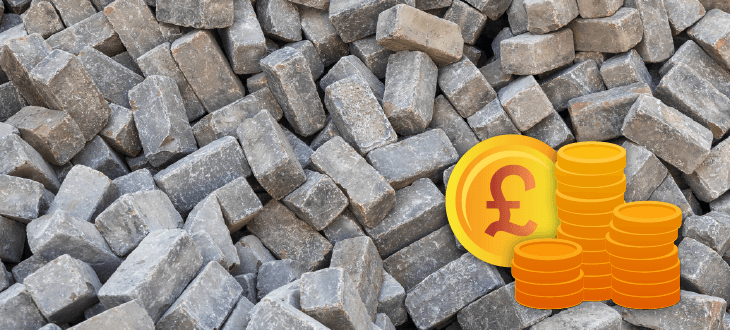
Installing a block paving driveway costs an average of £100 per square metre. On average, 50 block pavers are needed to cover 1 square metre, making the cost per block approximately £4. However, factors such as your location, and the project's complexity can influence the total block paving driveway cost.
The type of paver you choose will affect the block paving prices. The most common types of block pavers are concrete and clay brick, but other types are available in the UK, each with its benefits and uses. Below are the types of block pavers available in the UK:
| Driveway material | Average cost per m2 |
|---|---|
| Concrete pavers | £20 to £60 |
| Clay pavers | £70 to £100 |
| Natural stone pavers | £50 to £108 |
| Permeable pavers | £60 to £90 |
| Composite pavers | £95 to £125 |
When selecting pavers, your choice should depend on your personal preference and budget. Consider factors such as colour, texture, and overall aesthetic. You might prefer the rustic charm of natural stone or clay, or you may be looking for a uniform and sleek look of concrete. Additionally, you may want a more functional paver that prevents flooding, such as a permeable paver, or an eco-friendly choice like composite pavers.
Block paving prices vs other materials
Block paving driveway costs vary significantly compared to other materials, such as gravel, asphalt, and concrete. This is due to material type, design complexity, and installation costs. Below are the cost of block pavers and other driveway materials:
| Driveway materials | Small driveway (30m2) |
|---|---|
| Tarmac or asphalt | £1,200- £2,100 |
| Resin | £1,800-£3,000 |
| Gravel | £1,050- £1,650 |
| Flat poured concrete | £540-£750 |
| Concrete block paver | £600-£1,800 |
| Clay pavers | £1,200- £1,800 |
| Natural stone pavers | £1,860- £3,150 |
| Cobblestone | £600 -£2,100 |
Generally, block paving tends to be more expensive than gravel and asphalt. Still, depending on the chosen paver type and design intricacies, it can be comparable to or slightly higher than concrete.
Stone driveway pavers cost, for instance, is typically on the higher end of the price spectrum due to their durability and aesthetic appeal.
Conversely, concrete block pavers offer a more budget-friendly option while still providing versatility in design. Despite the higher initial cost, block paving is often a favoured driveway surface due to its long-term benefits, including durability, ease of maintenance, and the potential to enhance property value with its visually appealing and customizable patterns.
Block paving driveway: cost calculator UK

To accurately calculate the cost of a block paving driveway in the UK, you must consider several key factors. First, measure the total area of the driveway in square metres, as this directly affects the amount of materials needed.
The choice of pavers, such as natural stone, concrete, or clay, plays a significant role in determining the overall cost, with natural stone being typically the most expensive option.
Furthermore, labour costs vary based on the complexity of the design and the specific region within the UK. Other essential factors to consider include the preparation work needed, like excavation and laying a proper foundation, as well as additional features like edging, drainage, and sealants.
By carefully planning and calculating the cost of a block paving driveway, informed decisions can aid in budget planning and decision-making. In the following sections, we will provide more detailed guidance on how to calculate the cost of your block paving driveway.
Cost of block paving area preparation
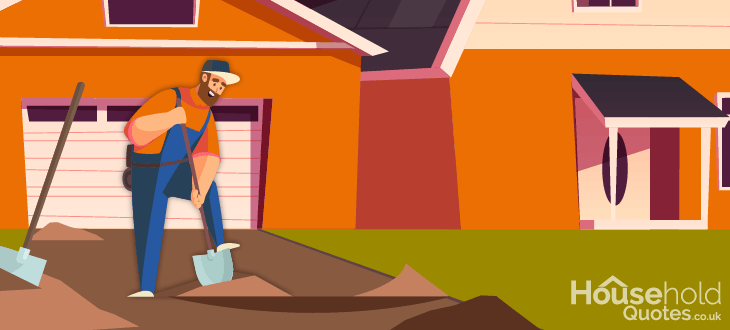
The cost of preparing an area for block paving can vary significantly based on several factors. The primary expenses include clearing the site, which may involve removing existing surfaces like grass, concrete, or old paving and disposing of waste materials.
Driveway specialists charge between £150 and £200 per day to remove an old driveway, which can take up to one to three days to clear the site for your new block driveway. Additionally, for waste removal, you will need to hire a skip, which can cost between £65 and £175 to rent, depending on the size of the skip you choose.
Additional costs of block paving area preparation include the addition of a sub-base and weed barrier. A sub-base is necessary and can cost around £53 for 50mm, this ensures that weight is evenly distributed on your driveway.
A weed barrier on the other hand is optional. They prevent the growth of weeds through your driveway and can cost between £30 to £50 per m2. You will save costs by skipping on a weed barrier. However, it will increase maintenance and potentially lead to repair costs.
Block paving costs: the complete process
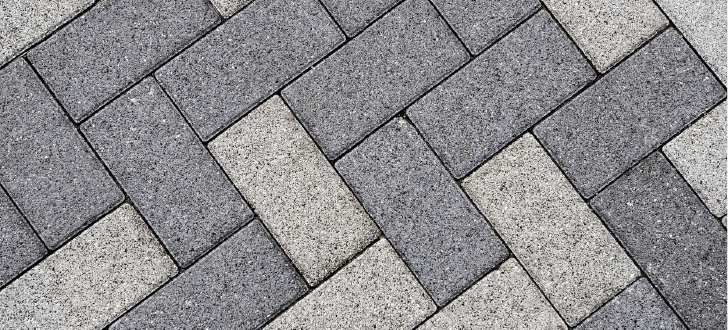
When planning and budgeting for a block paving driveway, several factors must be considered. First, you must determine its size and shape.
The average cost of materials for block pavers is around £100 per m2. Based on this, we can estimate the block paving driveway cost per size:
| Driveway size | Average cost |
|---|---|
| One car driveway (20m2) | £2,000 |
| Two car driveway (30m2) | £3,000 |
| Three car driveway (40m2) | £4,000 |
According to RatedPeople, the average cost of a two car driveway in the UK is between £6,150 to £17,500. This depends on the type of driveway you choose.
For block paving driveways, the average cost including material and labour is around £3,500 for a small one car driveway. They are more expensive than other types of paving driveways such as concrete, asphalt or gravel as they require more labour to install.
Typically block paving driveway installation will cost between £50 to £100 per m2. Costs will vary depending on the shape, size and design you have chosen for your new driveway as well as the experience of the local driveway companies.
The choice of pavers you choose will have a huge impact on block paving driveway costs. Depending on the material you choose and quality of the block paver you can expect to pay between £20 to £125 per m2.
Additional expenses include edge restraints, drainage systems, and finishing touches such as sealing the blocks to protect them from weathering. The cost of drainage systems may go up to £1,000, but expenses can be saved by opting for permeable paving driveways.
Sealing can cost up to £8.50 to £12.50 per m2, depending on the type of sealant you choose. The cost of edging can depend on the material you choose; options include timber, metal, plastic, and concrete, with timber being the least expensive and plastic being the most expensive.
Block paved driveway: cost of repairing
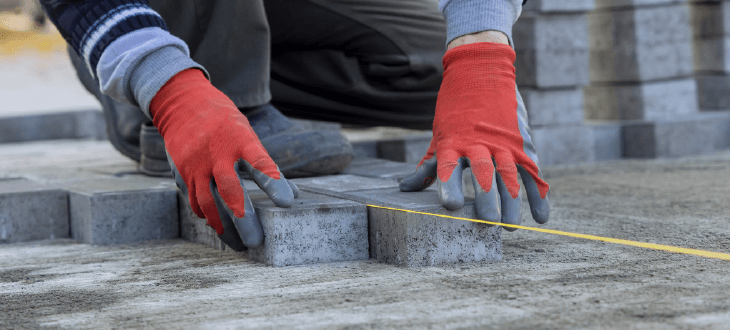
When it comes to maintaining a block paved driveway, repairing it can be a cost-effective way to extend its lifespan and preserve its visual appeal. The cost of repairs depends on the extent and type of damage.
In contrast to many other driveway types, block pavers are easy to repair because damaged blocks can be lifted out and replaced with new ones.
The cost of repairing a block paved driveway is determined by its size, shape, and the extent of the damage. On average, you can expect to pay between £150 to £200 per person daily to repair your driveway.
The repair work typically takes between one to two days, but this can vary based on the extent of damage to your driveway.
How much does it cost to lift and relay block paving?
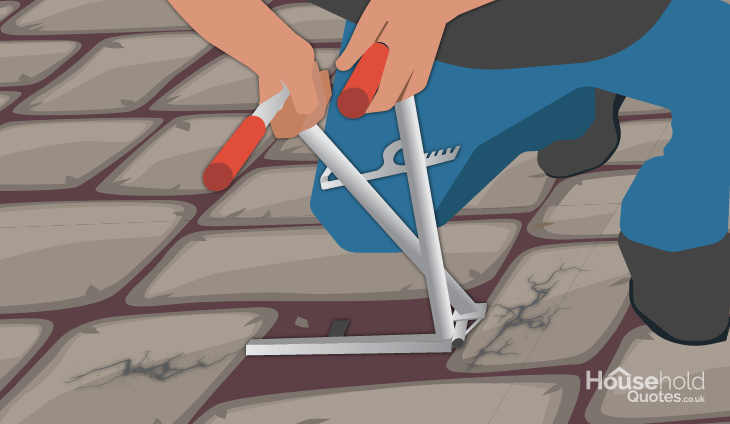
Sometimes, it's necessary to lift and relay block paving to fix issues like uneven surfaces, subsidence, or drainage problems, and the cost can vary based on several factors.
Usually, lifting and relaying a block paving driveway will cost between £150 to £200 per person per day. This cost includes removing the existing blocks, inspecting and potentially replacing the sub-base, levelling the area, and relaying the blocks in their original pattern or a new one if desired.
Costs may be higher if the existing blocks are damaged and need replacement, especially with high-quality or unique blocks.
Moreover, the complexity of the area, such as intricate patterns or edge restraints, can also increase labour costs.
Regional labour rates and the site's accessibility can also influence the overall cost, with more challenging locations potentially incurring additional charges.
Regular maintenance and early issue resolution can help minimise the need for extensive repairs, keeping overall costs lower in the long term.
To reduce costs, you can lift and relay block paving yourself. However, you will need a specialised tool, which can cost between £50 to £100.
Additionally, if you're doing it yourself, you must lay the new blocks, averaging around £300. Lastly, you will need kiln-dry sand to brush between the joints of the new blocks, which, on average, will cost around £250.
Cleaning and maintenance: block pavers cost
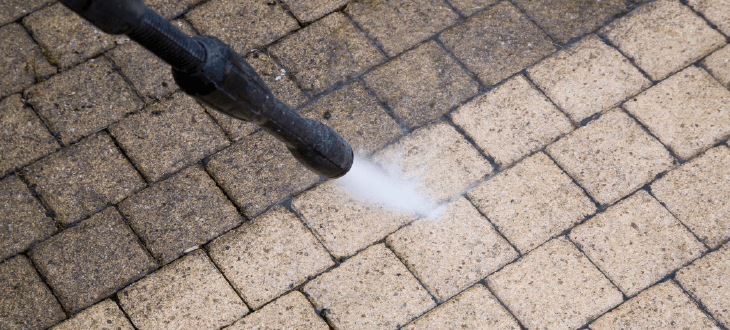
In the UK, it is crucial to regularly clean and maintain block pavers to preserve their appearance and functionality. The costs vary depending on the extent of the work required.
Routine cleaning involves sweeping to remove debris, pressure washing to eliminate stains and dirt, and re-sanding joints. This is essential to keep pavers looking pristine and prevent weed growth and shifting.
While you can clean your driveway yourself, it can be challenging and labour-intensive. Block pavers are known to be high-maintenance due to the potential of weed growth through the joints.
Hiring a driveway specialist will save time and effort. On average, cleaning and sealing a standard-size driveway costs around £300.
Below are the average block paving driveway costs for maintenance per driveway size:
| Driveway size | Average cost |
|---|---|
| Small driveway (20m2) | £200 |
| Medium driveway (40m2) | £300 |
| Large driveway (60m2) | £400 |
DIY driveway paving cost
To save up to £1,000 on your block paving driveway costs, you can opt for a do-it-yourself approach and eliminate the need for driveway specialists.
However, DIY block driveways require meticulous planning, preparation, and the right tools and materials. Below is a step-by-step guide on how to DIY your block-paving driveway:
- Mark out the driveway and dig to a depth of around 150mm. You may need a mini-digger.
- Install edge restraints to frame and hold the block paving driveway together. These restraints can be made from plastic, metal, concrete, or timber.
- Fill the area with a sub-base made from gravel and crushed rock.
- Install a weed barrier
- Add 100mm of hardcore and use a compactor to flatten it out.
- Add 50mm of damp sharp sand
- Lay the blocks on top of the sharp sand
- Once blocks are laid, brush in kiln-dry sand between the joints.
These are the required materials and tools you need to DIY your block paving driveway, along with the associated costs:
| Driveway materials | Average costs |
|---|---|
| Sub-base MOT Type 1 | £53 per 50mm |
| Weed barrier | £40 per m2 |
| Hardcore | £300 |
| Sharp sand | £250 |
| Kiln-dry sand | £250 |
| Driveway tools | Average costs |
|---|---|
| Mini-digger | £350 (to rent) |
| Compactor | £35 per day |
| Skip hire | £125 |
Opting for a DIY block paving driveway can lower expenses but demands significant time, effort, and specialised tools. You will also need to purchase all the necessary materials when choosing this route.
Errors during the process can lead to uneven surfaces, inadequate drainage, or shifting blocks, so conducting thorough research and consulting with professionals can be highly advantageous.
Hiring a driveway specialist is crucial to avoid these mistakes. Household Quotes can assist you in connecting with reputable local driveway experts.
Simply fill out our quick 30-second form, and we will provide you with four free, no-obligation quotes from the top driveway specialists in your area.
- Describe your needs
- Get free quotes
- Choose the best offer
It only takes 30 seconds

FAQ
On average, the cost to block pave a small one-car driveway is around £3,500. The total expenses may vary based on location, driveway size, shape, and chosen pattern.
A 2-car driveway can vary from £6,150 to £17,500. The price depends on factors such as the type of driveway material, its quality, the driveway’s size, and additional features like garden gates and lighting.
The main disadvantage of block paving driveways is their initial cost, as they are more expensive than other traditional types of paving, such as asphalt, concrete, or gravel. Another downside is their high-maintenance nature, as there is a potential for weeds to grow through the cracks. Regular maintenance is essential to avoid high repair costs.
Block paving is not cheaper than concrete because it is more labour-intensive to install than traditional flat-poured concrete. It takes longer to install, which increases the cost of labour. Additionally, prices may vary depending on the type of block you choose, such as clay or stone.

Caoimhe is an experienced content writer and researcher who is passionate about providing accessible information to every reader. With a background in English literature and Sociology, she combines the two disciplines to create cohesive, well-thought-out, and well-informed pieces.
